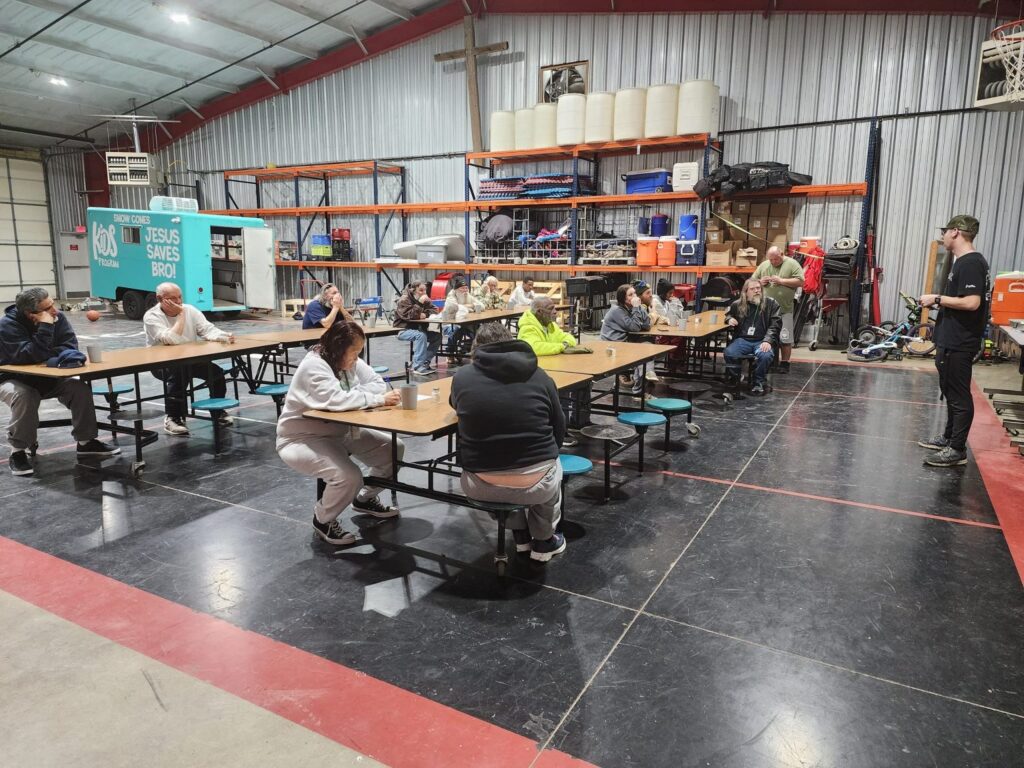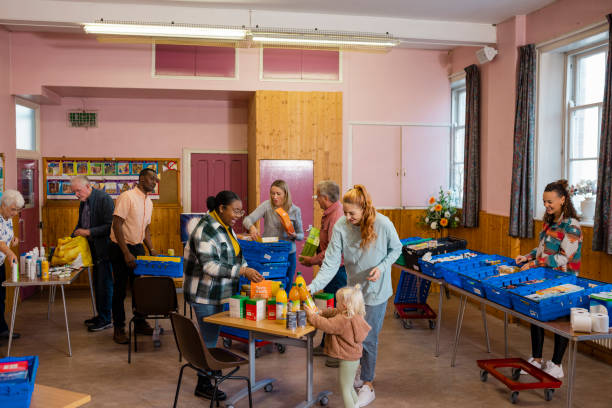When we are in financial straits there are many who look up “church food pantry near me” for an aid. If you’re faced with unexpected costs as well as job losses, or struggling to put food in the kitchen Faith-based food pantries are among the most accessible and caring options available. They don’t only hand their food, they also provide a sense of dignity, community and faith. They also help people connect with street outreach programs and provide essential aid to people who are homeless or experiencing crisis. We’ll look at the ways that church food pantries function in the first place, where to locate one, and the ways they’re improving lives day by day.

What is a Church Food Pantry?
A food pantry for churches is a charity program that is operated by local churches or other religious organization which distributes essential food items and other necessities to families and individuals that are in desperate need. It is often in collaboration with grocery stores, food banks and other community members to fill shelves with items like canned goods fresh food, fresh produce dairy products, as well as toiletries for the personal. They’re not only locations to buy groceries, they’re also spaces where action meets compassion and offer help to everyone regardless of religion, race or nationality.
Why Churches Offer Food Pantry Services
The foundation of churches is the desire to help the needs of others. Food distribution is the direct result of this mission. The Bible calls believers to be concerned for those who are poor or excluded, and food programs are a method to practice these values. The goal is not only about helping others, but all about showing compassion through actions. In many churches, providing the pantry can be an opportunity to get involved to the wider community as well as provide optimism for people who feel abandoned.
How to Find a Church Food Pantry Near You
If you’re on the internet looking for “church food pantry near me,” there are couple of reliable options to obtain quick and precise results. Google Maps is a great beginning point. You just need to type the term in the search bar, and it’ll provide the options that are based on where you live. Also, you can contact the local community centres, food banks and the United Way’s 1-2-1-1 hotline. Do not hesitate to contact nearby churches directly. The majority of them offer a daily or monthly food pantry program, and are eager and assist you.
What to Expect When Visiting a Church Food Pantry
Going to a food pantry the first time could be quite daunting, however it’s an easy and pleasant process. A majority of pantries will require the photo ID of the applicant and proof of address However, some do not need documentation. After you’ve approved, you’ll be given a bag of food items that has been pre-packaged or have the option of selecting products from the shelves. Volunteers are generally warm and helpful, and willing to assist, not to be a judge. Their goal is to feel comfortable and comfortable.
Types of Food Typically Offered
The food pantries of churches are designed to offer both perishable and food items that are fresh. It is possible to find canned vegetables as well as soups, pasta, rice and beans, cereals, and even snacks. A lot of them also have fresh fruits and vegetables as well as dairy products, frozen meats and breads, based on partnership and donations. Certain pantries go an additional mile to provide products that are diabetic or gluten-free. There are also diapers, hygiene items, baby toys or even food for pets at certain places.
Eligibility Requirements: Who Can Receive Help?
A majority of food pantries run by churches can be used by anyone in need, but they might prefer those who live in the area or households that have children. Contrary to the government’s programs, church-run pantries typically don’t need extensive documents or evidence of earnings. It is possible fill out a standard questionnaire and present an ID but it tends to be faster and easier. Certain churches provide the emergency bags of food without asking questions for people in need of immediate assistance.
Church Food Pantries vs. Government Programs
Food assistance programs offered by the government such as SNAP (food stamps) are life-changing however, they are accompanied by the burden of bureaucratic obstacles. Food pantries at churches offer an immediate answer with less hurdles. Furthermore, they don’t require you to wait for weeks before receiving approval. They often fill in the gap in government assistance when it is not enough or in the period of time required to apply. They form the safety net. However, religious services are a winner when speed and care for the individual is the top priority.
The Role of Street Outreach Services
Food pantries run by churches usually collaborate with street outreach programs too. These teams go directly into communities–especially areas with high rates of homelessness–and provide water, blankets, hygiene kits, and emergency food. They can also assist in connecting people with healthcare facilities, shelters addiction recovery and housing assistance. Outreach services provide the first line of hope. They reach those who are in need in the process of guiding them towards longer-term stable living.
Volunteering at a Church Food Pantry
Volunteers make up the lifeblood of every food pantry. If you’ve received help from the organization or just would like to help others think about taking on a volunteer role. The tasks include the stocking of shelves, packing bags, serving guests as well as helping out in the logistics. It’s an enjoyable method to make friends and have a significant impact in the lives of others. Just a couple of minutes a week could make an enormous effect.
Donating to a Church Food Pantry
In the event that you aren’t in desperate need however you’d like to assist you can always donate. Many churches accept canned items such as dry food, baby items, hygiene products as well as reusable bags for grocery shopping. The financial donations can be extremely useful as they enable food pantry items to be purchased at a large scale or fill the gaps in food supply. Many churches have Amazon wishlists and online giving platforms which allow for easy and quick donations.
Seasonal Food Drives and Special Events
The majority of church food pantries conduct special food drives in the fall around holidays like Christmas, Thanksgiving and back-to-school seasons. These drives allow them to replenish items when the need is greatest. Some churches also hold celebrations like community dinners along with coat drives or giveaways of backpacks to students for the back of school. These activities do more than provide financial aid, they foster a sense of belonging and help remind people that they’re not the only ones.
Mobile Food Pantries: Taking the Pantry to the People
Certain churches operate Mobile food pantries that deliver meals to areas where transport is difficult. The vans or trucks are filled with necessities and are able to visit parks, schools or areas with limited access to food according to a set program. It’s an excellent method to make sure that those who cannot make it to the church will still receive the assistance they need. Mobile pantries can provide assistance to hundreds of families during just one trip.

How Church Food Pantries Impact the Community
The positive impact of the church’s food pantries extends far beyond empty stomachs. They improve dignity, decrease anxiety, and strengthen relationships. If parents are struggling, it’s calm. If you’re a senior with a fixed income the relief is a source of peace. For many, it’s the initial step towards stabilization, recovery and a change. Food pantries at churches quietly make a web of kindness that promotes healing for the entire population.
Real Stories of Hope and Healing
Every visit to the pantry has the narrative. One single mom feeds her family while seeking employment. Veteran trying to survive through disability. A retired couple whose pension doesn’t stretch far enough. They’re not just statistics, they’re real individuals who require compassion, not sympathy. Food pantries at churches are a place where the stories of these people are shared acknowledged, cherished, and addressed by the right actions.
How You Can Spread the Word
If you’re not in need of food pantries but you could be one of the solutions. Post locations of local food pantries through social media. Your neighbors should know that assistance is on the way. Help to raise awareness for the needy in your neighborhood. Sometimes, the most effective action you can take is simple to tell people, “There’s help out there, and I’ll walk with you to find it.”
Conclusion: A Simple Search, A Life Changed
Writing “church food pantry near me” on your smartphone may appear like an insignificant gesture, but it could bring about something incredibly important: a lunch, a smile or the lifeline. These pantries run by churches are peaceful gigantic, offering mercy through grocery bags as well as kindness within milk containers. These pantries remind us of the fact that, even the most difficult times the community of compassion and solidarity are all around us. In case you’re in dire need or are able to assist you, there’s room for you within this circle of generosity.
FAQs
1. When can I go to the church’s food pantry The majority of pantries permit visits every week, or every month according to their capacity. Make sure to inquire with the particular church for the schedule of their pantry.
2. Do I need to belong to the church in order to benefit from food? Not at all. Food pantries for churches serve everyone in the population, regardless of religion affiliation.
3. What do I need to bring to an apron? In general, identification with a photo and proof of address is helpful, though some pantries will still accept people with no IDs.
4. Are there any fresh foods that I can donate to a local church’s pantry Many pantries will accept food items and fresh things, specifically those that have refrigeration. Make sure to call ahead for confirmation.
5. Are there food pantries in churches that can deliver Certain churches will deliver to homes for people with disabilities, seniors or those without transport. Contact your local food pantry to inquire about choices.